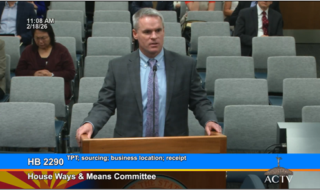October 27, 2022 Last Edit: June 5, 2025
COLUMN: Tax Cuts a Good Start, but More Needed to Help Local Businesses
NFIB State Director Brad Jones writes about the recently-approved tax cuts and what’s next for Missouri’s small businesses.
It’s been a rough couple of years for Missouri’s small businesses. The problems began with the pandemic and continue with the labor shortage, supply chain disruptions, and soaring prices on everything from raw materials to what local businesses pay in rent.
Thankfully, the Missouri Legislature and Governor Parson have provided some financial relief by setting partisan politics aside and agreeing on a plan to reduce personal and corporate income tax rates. In signing it into law earlier this month, Parson said the estimated $760 million reduction would be “the largest tax cut in the state’s history.”
Missouri was already on track to reduce the highest individual income tax rate from 5.3% to 5.2% in January. There was a plan on the books to reduce the individual rate to 4.8% if specific revenue goals could be achieved.
Under this new tax-cut measure, the individual rate will drop to 4.95% in January and exempt the first $1,000 in income from taxes. The tax rate could fall to 4.8% as early 2024 if state tax revenue grows by at least $175 million.
Of course, we’re talking only a fraction of a percentage, but small businesses operate on notoriously thin profit margins, so every nickel helps. The measure also includes three additional tax cuts that could eventually reduce the rate to 4.5% if state revenue grows at a specified rate.
This is a big deal to Missouri’s small businesses because most are organized as pass-through entities, meaning they’re taxed at the individual rate. Under this setup, revenue passes through the business and is reported on the owner’s individual tax return.
Of course, this action alone won’t solve all the problems facing Missouri’s small businesses.
The latest National Federation of Independent Business Small Business Optimism Index showed that inflation remains the No. 1 problem facing Main Street businesses. Quality of labor ranks second, followed by taxes and labor costs.
When the General Assembly gavels into session in January, we hope the legislature does no harm and acts in the best interest of Missouri’s job creators. Cutting taxes was a crucial first step, but Main Street businesses still struggle to find enough workers. Plus, there are still communities without broadband, making it hard for local employers to compete.
According to the U.S. Small Business Administration, small businesses account for 99.4 percent of all businesses in Missouri and employ about 45 percent of the state’s workforce. When the legislature comes together to help small businesses, it helps all of Missouri.
NFIB is a member-driven organization advocating on behalf of small and independent businesses nationwide.
Related Articles














